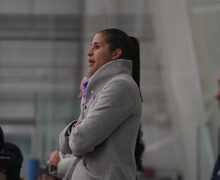Panelists discuss innovation, future of digital media on day of studio dedication
Despite all the changes to digital media, students should not be anxious about the constant innovation.
“Be uncomfortably excited about the disruption you can bring,” said Kristina Hahn, head of consumer packaged goods at Google.
Hahn spoke as part of a “Future of Digital Media” symposium held in Joyce Hergenhan Auditorium on Monday morning. The symposium was part of a day of events celebrating the dedication of the Newhouse studios. Dan Pacheco, the Peter A. Horvitz Endowed Chair in Journalism Innovation, moderated a panel of four members of the multimedia industry.
The theme of the event was “innovation never stops,” Pacheco said after he introduced the members of the panel.
The panelists included Hahn, Mitch Gelman, vice president of product at Gannett Digital, Larry Hryb, Xbox Live director of programming and Ed Wise, senior vice president of entertainment at Turner Digital. During the symposium they discussed their respective fields and how they, as well as all media professionals, will confront the digitization of media.
Hahn shared Google’s theory of connecting with its audiences. “Answer, converse, anticipate,” are the three verbs that Google lives by, she said. Hahn added that she believes these principles are a guiding force even in the uncertain future of digital media.
Wise presented next, focusing on branded content. He shared multiple videos, all seemingly advertising one product while incorporating another that benefitted just as much from the exposure.
“The authenticity of branded content is key,” he said, a statement that was repeated by the other three panelists throughout the event.
Wise recounted a quote he heard from documentarian Morgan Spurlock, which said “if you can make them laugh, you can make them listen.” Wise used the quote to refer to the position of Funny or Die in Turner’s media conglomerate.
Hryb and Gelman both discussed the importance of the audience controlling the narrative.
Gelman worked with The Des Moines Register on a groundbreaking project that took viewers to a farm in southwestern Iowa. The team used Oculus Rift technology to produce a 360-degree virtual reality view of a sixth generation family farm to tell its story.
Hryb described the gaming industry’s exponential rise, focusing on the audience’s role in creating and controlling the narrative. He observed that the experience was no longer sitting with a controller and headset, but using technology such as Xbox Kinect as a way to experience media.
The audience at the Herg Monday was comprised of both students and guests for the dedication ceremony that was set to take place later in the day.
Brendan Germain, a sophomore television, radio and film major, said the panel was a good fit for the unveiling of the new studios.
“I think this definitely has more prevalence in the building of these new studios, and also where Newhouse is going as well,” he said. “I was more interested in coming to this to see what some industry professionals are thinking about where media journalism is going.”
The four speakers were asked about bold predictions in the next 10 years relating to the massive convergence occurring in media today.
Wise said, “Facebook’s not going anywhere.”
Gelman said, “innovative ideas (like the ones presented) will become mainstream.”
Hryb predicted a “merging of video games” with the innovative technology and ideas discussed at the symposium.
Hahn ended the predictions by saying, “in the next five years, 75 percent of advertisements will be user choice or skipped.”
But the key to any media success, as Gelman said, is to learn about new audiences.
“Understand and respect audience,” he said. “New media connects with new audiences.”
Published on September 30, 2014 at 12:01 am
Contact Danny: dmantoot@syr.edu





